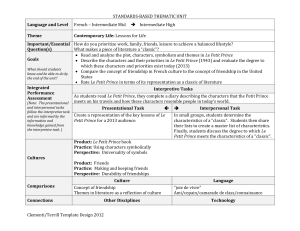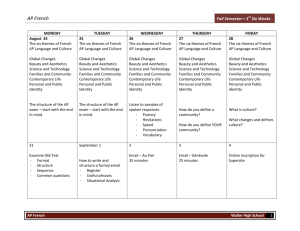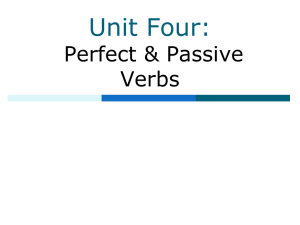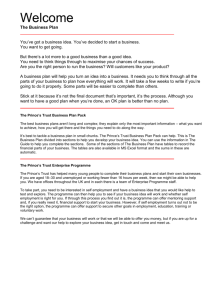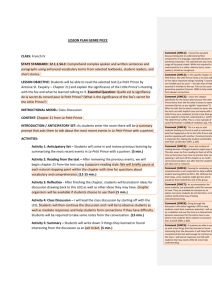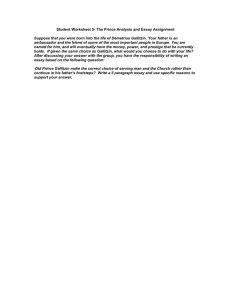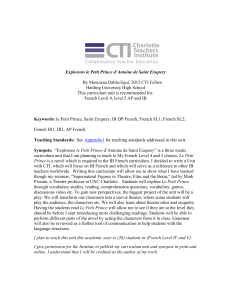Pacing Schedule for French 4 : 2005
advertisement
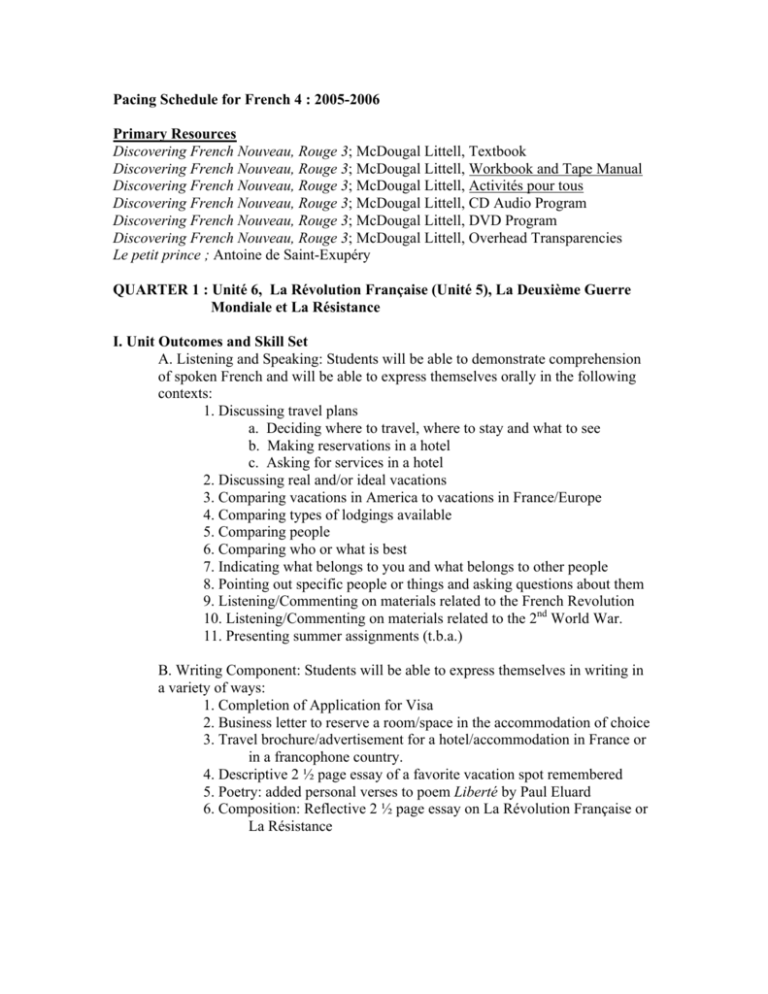
Pacing Schedule for French 4 : 2005-2006 Primary Resources Discovering French Nouveau, Rouge 3; McDougal Littell, Textbook Discovering French Nouveau, Rouge 3; McDougal Littell, Workbook and Tape Manual Discovering French Nouveau, Rouge 3; McDougal Littell, Activités pour tous Discovering French Nouveau, Rouge 3; McDougal Littell, CD Audio Program Discovering French Nouveau, Rouge 3; McDougal Littell, DVD Program Discovering French Nouveau, Rouge 3; McDougal Littell, Overhead Transparencies Le petit prince ; Antoine de Saint-Exupéry QUARTER 1 : Unité 6, La Révolution Française (Unité 5), La Deuxième Guerre Mondiale et La Résistance I. Unit Outcomes and Skill Set A. Listening and Speaking: Students will be able to demonstrate comprehension of spoken French and will be able to express themselves orally in the following contexts: 1. Discussing travel plans a. Deciding where to travel, where to stay and what to see b. Making reservations in a hotel c. Asking for services in a hotel 2. Discussing real and/or ideal vacations 3. Comparing vacations in America to vacations in France/Europe 4. Comparing types of lodgings available 5. Comparing people 6. Comparing who or what is best 7. Indicating what belongs to you and what belongs to other people 8. Pointing out specific people or things and asking questions about them 9. Listening/Commenting on materials related to the French Revolution 10. Listening/Commenting on materials related to the 2nd World War. 11. Presenting summer assignments (t.b.a.) B. Writing Component: Students will be able to express themselves in writing in a variety of ways: 1. Completion of Application for Visa 2. Business letter to reserve a room/space in the accommodation of choice 3. Travel brochure/advertisement for a hotel/accommodation in France or in a francophone country. 4. Descriptive 2 ½ page essay of a favorite vacation spot remembered 5. Poetry: added personal verses to poem Liberté by Paul Eluard 6. Composition: Reflective 2 ½ page essay on La Révolution Française or La Résistance C. Reading Component : Students will be able to demonstrate comprehension of a variety of reading materials including (but not limited to) the following: 1. Lodging descriptions from travel brochures, the Internet and the Guide Michelin 2. Magazine articles on travel spots 3. Hotel brochures/advertisements created by peers 4. Short story titled Une étrange aventure (text) 5. Descriptive account of Holocaust survivor 6. Song : La Marseillaise 7. Poem : Liberté, Paul Eluard D. Cultural Component: Students will demonstrate knowledge of 1. French travel options available to them such as gites, auberges de jeunesse, terrains de camping, séjours en famille, programmes d’échange, travail en fermes 2. Historical periods of La Révolution Française and La Deuxième Guerre Mondiale II. Grammar and Vocabulary 1. Hotel accomodations and services 2. Compararative and superlative constructions 3. Adverbs and adjectives to improve descpriptions 4. Relative pronouns: lequel and forms, celui and forms, 5. Possessive pronoun le mien and all similar forms 6. Review of le passé composé and l’imparfait 7. Le subjonctif III. Assessment : 1. Oral and written presentations of summer reading assignment 2. Vocabulary quiz on Unit 6 vocabulary 3. Activities as described above will be assessed through projects, quizzes, tests and essays 4. Midterm test to include grammar, vocabulary and cultural elements QUARTER 2 : Unité 7, Unité 9, Le Surréalisme I. Unit Outcomes and Skill Set A. Listening and Speaking: Students will be able to demonstrate comprehension of spoken French and will be able to express themselves orally in the following contexts: 1. At the doctor’s office, the dentist, the emergency ward; describing symptoms and explaining what is wrong 2. Giving information about medical history 3. Understanding the doctor’s advice 4. Expressing emotions of joy, sorrow, fear, doubt, disbelief, attitudes 5. Describing degrees of friendship 6. Expressing different feelings towards other people 7. Discussing the state of one’s relationship with other people 8. Congratulating, comforting, and expressing sympathy for other people 9. Describing the various phases of a person’s life 10. Talking about friends and acquaintances 11. Discussing the Surrealist movement, its artists and their works B. Writing Component: Students will be able to express themselves in writing in a variety of ways: 1. Completion of a health questionnaire 2. Poster highlighting important elements of a health issue 3. Captions to Gary Larson cartoons using subjonctif (Halloween) 4. Greeting cards expressing congratulations, sympathy, etc. 5. Description of Community Service Work at SI or elsewhere 6. Album of photos with detailed description of an older family member or acquaintance 7. Poster of famous Surrealist artist to accompany oral project C. Reading Component : Students will be able to demonstrate comprehension of a variety of reading materials including (but not limited to) the following: 1. Magazine articles regarding world health issues (francophone countries) 2. Internet project: Médecins Sans Frontières 3. Articles on National Health Services in France 4. Poem « Pour faire le portrait d’un oiseau » de Jacques Prévert 5. Short story Le Bracelet (text) D. Cultural Component: Students will demonstrate knowledge of 1. French and francophone health services 2. Surrealist art movement; artists’ involvement with La Résistance II. Grammar and Vocabulary 1. Subjonctif with emotions, certainty, doubt, 2. Passé du Subjonctif 3. Verbs croire and craindre 4. Reflexive verbs used to express a reciprocal action 5. Relative pronouns qui and que, dont, ce qui, ce que, ce dont 6. Prepositions used with relative pronouns 7. Vocabulary from Unit 7: health; doctor/dentist/hospital visits 8. Vocabulary from Unit 9: personal relationships; phases of life III. Assessment 1. Vocabulary quizzes 2. Oral Situations/Presentations 3. Unit Tests 4. Semester Exam: Cumulative exam of first and second quarters QUARTER 3 : Unité 8, La Colonisation, La Musique RAP, Le Petit Prince I. Unit Outcomes and Skill Set A. Listening and Speaking: Students will be able to demonstrate comprehension of spoken French and will be able to express themselves orally in the following contexts: 1. Making a date and fixing the time and place 2. Explaining where one lives and how to get there 3. Discussing the advantages and disadvantages of city life vs. country life 4. Describing your neighborhood 5. Formulating polite requests 6. Hypothesizing about what one would do under certain circumstances 7. Listening to French RAP artists 8. Listening to excerpts of Le Petit Prince 9. Discussing elements of Le Petit Prince 10. Discussing colonization and decolonization B. Writing Component: Students will be able to express themselves in writing in a variety of ways: 1. Multi-verse RAP song illustrating selected RAP themes 2. Additional poetic verse to add to selected francophone poem 3. Essay on Colonization 4. Reflection on Racism in the contexts of New Orleans and Paris C. Reading Component: Students will be able to demonstrate comprehension of a variety of reading materials including (but not limited to) the following: 1. Survey on city vs. country 2. Short story: Les Pêches 3. Poetry of the francophone world by Aimé César and David Diop 4. French RAP songs by current French and francophone artists 5. Articles on Internet regarding the demonstrations in Paris in 2005 6. Articles on David Belle’s creation of parkours 7. Chapters 1-9 of Le Petit Prince D. Cultural Component: Students will demonstrate knowledge of 1. French agency SOS Racisme 2. Parkours and its French origins 3. RAP and French government’s current politics 4. Beloved author Exupéry and his most well know novel, Le Petit Prince II. Grammar and Vocabulary 1. Vocabulary from Unité 8: meetings in town; describing your environs 2. Vocabulary from Chapters 1-9 of Le Petit Prince 3. Idiomatic Expressions and Grammar from Le Petit Prince 4. Use of si + l’imparfait 5. Le plus-que-parfait 6. Conditional Tense 7. Use of si with conditional 8. Past Conditional III. Assessment: 1. Unit 8 vocab quiz and Unit 8 test 2. Reading and vocabulary quizzes from Le Petit Prince 3. Project: RAP video 4. Oral Situation: Debate (topics include Racism, Colonization, City/Country) QUARTER 4 : Le Petit Prince, Unité 10, I. Unit Outcomes and Skill Set A. Listening and Speaking: Students will be able to demonstrate comprehension of spoken French and will be able to express themselves orally in the following contexts: 1. Deciding on a college major and talking about university courses 2. Discussing career options and varied work environments 3. Describing one’s qualifications at a job interview 4. Describing simultaneous actions 5. Explaining the purpose of an action 6. Describing how your actions affect others 7. Discussion of Chapters 10 through 27 in Le Petit Prince 8. Role Play: Characters in Le Petit Prince meet at a party B. Writing Component: Students will be able to express themselves in writing in a variety of ways: 1. Poster for Career Fair project 2. Résumé writing assignment 2. Creative writing assignment: Students write their own chapter to add to the planetary adventures of Le Petit Prince 3. In-class Essay: Themes of Le Petit Prince C. Reading Component: Students will be able to demonstrate comprehension of a variety of reading materials including (but not limited to) the following: 1. Chapters 10 through 27 of Le Petit Prince 2. Biography of Antoine de Saint-Exupéry and news article about the discovery of his plane near Marseille 3. Short Story: Le Portrait 4. Document: CV D. Cultural Component: Students will demonstrate knowledge of 1. Comparison and contrast of education systems in France and the U.S. 2. Le Bac: Its history and importance 3. The French/European CV (résumé) II. Grammar and Vocabulary 1. Professions and professional life 2. University courses 3. Job seeking 4. Vocabulary from Chapters 10-27 of Le Petit Prince 5. Idiomatic Expressions and Grammar from Le Petit Prince 6. Infinitive constructions 7. Past infinitive 8. Present Participle 9. Subjonctif with conjunctions III. Assessment 1. Quizzes, Tests, Essays on topics related to Le Petit Prince 2. Oral Situation: Characters in Petit Prince have a party. 3. Creative writing project: Write your own chapter of Le Petit Prince with illustrations 4. Unit 10 vocabulary quiz 5. Unit 10 test 6. Final Exam: Cumulative Semester 2 exam


